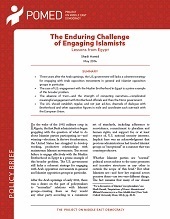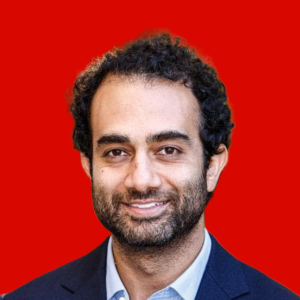For a full text copy of the brief, click here.
 In the wake of the 1992 military coup in Algeria, the first Bush administration began grappling with the question of what to do about Islamist parties participating in – and winning – elections. In the two decades since, the United States has struggled to develop working, productive relationships with mainstream Islamist movements. The recent failure to engage effectively with the Muslim Brotherhood in Egypt is a prime example of this broader problem. The U.S. government still lacks a coherent strategy for engaging with Arab opposition movements in general and Islamist opposition groups in particular.
In the wake of the 1992 military coup in Algeria, the first Bush administration began grappling with the question of what to do about Islamist parties participating in – and winning – elections. In the two decades since, the United States has struggled to develop working, productive relationships with mainstream Islamist movements. The recent failure to engage effectively with the Muslim Brotherhood in Egypt is a prime example of this broader problem. The U.S. government still lacks a coherent strategy for engaging with Arab opposition movements in general and Islamist opposition groups in particular.
POLICY RECOMMENDATIONS
- In light of the difficulties of meeting with Brotherhood members inside of Egypt, U.S. Embassy personnel should meet with legal teams representing imprisoned Islamist leaders and visit political prisoners when possible.
- The U.S. can and should engage regularly with the many Brotherhood and other opposition figures currently in exile, primarily in Qatar, Turkey, and the United Kingdom.
- The Obama administration should coordinate its engagement efforts with the European Union, including at the highest levels.
- While engagement is important in and of itself, at the very least for gauging political conditions on the ground, the U.S. should clarify the place of dialogue efforts in overall U.S. policy toward Egypt.
- The administration should more strongly push the Egyptian government to allow local and international civil society organizations the ability to work freely without fear of harassment, especially as elections near.
- The administration must make clear, privately and publicly, that harassment of Embassy personnel, including local staff, is unacceptable.
- The administration should more clearly articulate its Egypt policy to congressional leaders and work to ensure that members of Congress traveling to Egypt do not undermine U.S. interests on those trips.
- The administration should state publicly that counterterrorism efforts in the region should not be politicized, and that counterterrorism assistance provided to regional allies can only be directed toward actors mutually recognized as terrorist groups.
Shadi Hamid is a fellow with the Project on U.S. Relations with the Islamic World at the Brookings Institution’s Saban Center for Middle East Policy. He is the author of Temptations of Power: Islamists and Illiberal Democracy in a New Middle East (Oxford University Press, 2014). He served as director of research at the Brookings Doha Center until January 2014. Prior to joining Brookings, Hamid was director of research at the Project on Middle East Democracy and a Hewlett Fellow at Stanford University’s Center on Democracy, Development, and the Rule of Law. Hamid is currently vice-chair of POMED’s board of directors, a member of the World Bank’s MENA Advisory Panel, and a regular contributor to The Atlantic.
Photo credit: Yull Weeks, Voice of America



